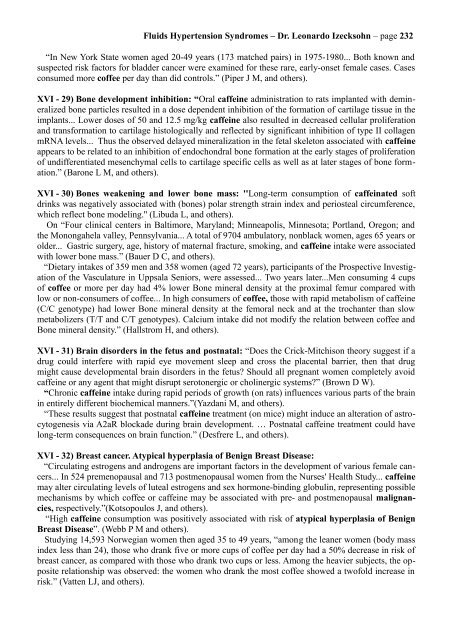Fluids Hypertension Syndromes: Migraines, Headaches, Normal ...
Fluids Hypertension Syndromes: Migraines, Headaches, Normal ...
Fluids Hypertension Syndromes: Migraines, Headaches, Normal ...
You also want an ePaper? Increase the reach of your titles
YUMPU automatically turns print PDFs into web optimized ePapers that Google loves.
<strong>Fluids</strong> <strong>Hypertension</strong> <strong>Syndromes</strong> – Dr. Leonardo Izecksohn – page 232<br />
“In New York State women aged 20-49 years (173 matched pairs) in 1975-1980... Both known and<br />
suspected risk factors for bladder cancer were examined for these rare, early-onset female cases. Cases<br />
consumed more coffee per day than did controls.” (Piper J M, and others).<br />
XVI - 29) Bone development inhibition: “Oral caffeine administration to rats implanted with demineralized<br />
bone particles resulted in a dose dependent inhibition of the formation of cartilage tissue in the<br />
implants... Lower doses of 50 and 12.5 mg/kg caffeine also resulted in decreased cellular proliferation<br />
and transformation to cartilage histologically and reflected by significant inhibition of type II collagen<br />
mRNA levels... Thus the observed delayed mineralization in the fetal skeleton associated with caffeine<br />
appears to be related to an inhibition of endochondral bone formation at the early stages of proliferation<br />
of undifferentiated mesenchymal cells to cartilage specific cells as well as at later stages of bone formation.”<br />
(Barone L M, and others).<br />
XVI - 30) Bones weakening and lower bone mass: ''Long-term consumption of caffeinated soft<br />
drinks was negatively associated with (bones) polar strength strain index and periosteal circumference,<br />
which reflect bone modeling.'' (Libuda L, and others).<br />
On “Four clinical centers in Baltimore, Maryland; Minneapolis, Minnesota; Portland, Oregon; and<br />
the Monongahela valley, Pennsylvania... A total of 9704 ambulatory, nonblack women, ages 65 years or<br />
older... Gastric surgery, age, history of maternal fracture, smoking, and caffeine intake were associated<br />
with lower bone mass.” (Bauer D C, and others).<br />
“Dietary intakes of 359 men and 358 women (aged 72 years), participants of the Prospective Investigation<br />
of the Vasculature in Uppsala Seniors, were assessed... Two years later...Men consuming 4 cups<br />
of coffee or more per day had 4% lower Bone mineral density at the proximal femur compared with<br />
low or non-consumers of coffee... In high consumers of coffee, those with rapid metabolism of caffeine<br />
(C/C genotype) had lower Bone mineral density at the femoral neck and at the trochanter than slow<br />
metabolizers (T/T and C/T genotypes). Calcium intake did not modify the relation between coffee and<br />
Bone mineral density.” (Hallstrom H, and others).<br />
XVI - 31) Brain disorders in the fetus and postnatal: “Does the Crick-Mitchison theory suggest if a<br />
drug could interfere with rapid eye movement sleep and cross the placental barrier, then that drug<br />
might cause developmental brain disorders in the fetus? Should all pregnant women completely avoid<br />
caffeine or any agent that might disrupt serotonergic or cholinergic systems?” (Brown D W).<br />
“Chronic caffeine intake during rapid periods of growth (on rats) influences various parts of the brain<br />
in entirely different biochemical manners.”(Yazdani M, and others).<br />
“These results suggest that postnatal caffeine treatment (on mice) might induce an alteration of astrocytogenesis<br />
via A2aR blockade during brain development. … Postnatal caffeine treatment could have<br />
long-term consequences on brain function.” (Desfrere L, and others).<br />
XVI - 32) Breast cancer. Atypical hyperplasia of Benign Breast Disease:<br />
“Circulating estrogens and androgens are important factors in the development of various female cancers...<br />
In 524 premenopausal and 713 postmenopausal women from the Nurses' Health Study... caffeine<br />
may alter circulating levels of luteal estrogens and sex hormone-binding globulin, representing possible<br />
mechanisms by which coffee or caffeine may be associated with pre- and postmenopausal malignancies,<br />
respectively.”(Kotsopoulos J, and others).<br />
“High caffeine consumption was positively associated with risk of atypical hyperplasia of Benign<br />
Breast Disease”. (Webb P M and others).<br />
Studying 14,593 Norwegian women then aged 35 to 49 years, “among the leaner women (body mass<br />
index less than 24), those who drank five or more cups of coffee per day had a 50% decrease in risk of<br />
breast cancer, as compared with those who drank two cups or less. Among the heavier subjects, the opposite<br />
relationship was observed: the women who drank the most coffee showed a twofold increase in<br />
risk.” (Vatten LJ, and others).


